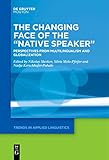The Changing Face of the “Native Speaker” : Perspectives from Multilingualism and Globalization / ed. by Nikolay Slavkov, Sílvia Melo-Pfeifer, Nadja Kerschhofer-Puhalo.
Material type: TextSeries: Trends in Applied Linguistics [TAL] ; 31Publisher: Berlin ; Boston : De Gruyter Mouton, [2021]Copyright date: ©2022Description: 1 online resource (VI, 355 p.)Content type:
TextSeries: Trends in Applied Linguistics [TAL] ; 31Publisher: Berlin ; Boston : De Gruyter Mouton, [2021]Copyright date: ©2022Description: 1 online resource (VI, 355 p.)Content type: - 9781501517693
- 9781501512100
- 9781501512353
- online - DeGruyter
- Issued also in print.
| Item type | Current library | Call number | URL | Status | Notes | Barcode | |
|---|---|---|---|---|---|---|---|
 eBook
eBook
|
Biblioteca "Angelicum" Pont. Univ. S.Tommaso d'Aquino Nuvola online | online - DeGruyter (Browse shelf(Opens below)) | Online access | Not for loan (Accesso limitato) | Accesso per gli utenti autorizzati / Access for authorized users | (dgr)9781501512353 |
Frontmatter -- Contents -- Introduction: The changing face of the “native speaker” -- Part one: Conceptual discussions -- Chapter 1 Why the mythical “native speaker” has mud on its face -- Chapter 2 The multilingual and multicompetent native speaker -- Chapter 3 New speakers: New linguistic subjects -- Part two: Practices and representations -- Chapter 4 Is there a native speaker in the class? A didactic view of a problematic notion -- Chapter 5 On the paradox of being native speakers of two “competing” languages: Turkish as the mother or the father tongue of Greek nationals -- Chapter 6 What kind of speakers are these? Placing heritage speakers of Russian on a continuum -- Chapter 7 The out-of-sight of “native speaker”: A critical journey through models of social representations of plurilingual identities -- Chapter 8 Practice-proof concepts? Rethinking linguistic borders and families in multilingual communication: Exploiting the relationship between intercomprehension and translanguaging -- Part three: Policies and controversies -- Chapter 9 Provenance and possession: Rethinking the mother tongue -- Chapter 10 The pluricentricity and ownership of English -- Chapter 11 “I want to be bilingual!” Contested imaginings of bilingualism in New Brunswick, Canada -- Chapter 12 Questioning the questions: Institutional and individual perspectives on children’s language repertoires -- Afterword -- Index
restricted access online access with authorization star
http://purl.org/coar/access_right/c_16ec
The notion of the native speaker and its undertones of ultimate language competence, language ownership and social status has been problematized by various researchers, arguing that the ensuing monolingual norms and assumptions are flawed or inequitable in a global super-diverse world. However, such norms are still ubiquitous in educational, institutional and social settings, in political structures and in research paradigms. This collection offers voices from various contexts and corners of the world and further challenges the native speaker construct adopting poststructuralist and postcolonial perspectives. It includes conceptual, methodological, educational and practice-oriented contributions. Topics span language minorities, intercomprehension, plurilingualism and pluriculturalism, translanguaging, teacher education, new speakers, language background profiling, heritage languages, and learner identity, among others. Collectively, the authors paint the portrait of the "changing face of the native speaker" while also strengthening a new global agenda in multilingualism and social justice. These diverse and interconnected contributions are meant to inspire researchers, university students, educators, policy makers and beyond.
Issued also in print.
Mode of access: Internet via World Wide Web.
In English.
Description based on online resource; title from PDF title page (publisher's Web site, viewed 25. Jun 2024)


